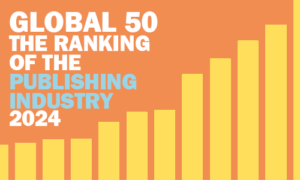Neu! >> Was ist „Publishing Beyond Publishers“
NEW: Ebooks, audiobooks, sales, subscriptions, streaming – the Digital Consumer Book Barometer 2021 is out
More digital book consumption, new audiences, a sustainable upswing:
2020 was a breakthrough year for digital consumer books, bringing new opportunities in reaching new audiences and an expansion in e-book and audiobook consumption in subscription, e-lending and streaming models.
The Digital Consumer Book Barometer provides detailed insights and analysis based on solid and exclusive market data in Germany, Austria, Switzerland, Italy, Spain, French speaking Canada, Brazil and Mexico.
Lockdowns, home office and home schooling have boosted digital consumption of books across all formats and channels, opening new opportunities to the book business, with similar developments across all markets and segments.
Sales soared, triggered in spring 2020 at first by the impact of pandemic restrictions. But soon, after a short lull in summer, the trend turned out to be a sustainable game changer for the entire digital book business.
One of the major surprises was the gain in popularity for subscription services and related models of continuous consumption, as in digital libraries or audiobook streaming from music services. In both German language markets as in Brazil, the increase reached massive gains for subscription and e-elending year-over-year from 2019 to 2020.
Good news for traditional publishers operating in the digital fields is that price levels could by and large be kept stable over the past 5 years in most countries, including Italy, Germany, or French speaking Canada. In more volatile markets such as Mexico or Brazil, the overall average price level went lightly down, but publishers found out, as good news, that consumers embraced not only cheap thrills, but were prepared to pay even more for high quality titles.
Overall, after ebooks having been losing some appreciation by book market commentators lately, a turnaround with sustainable gains seems to be the outcome of 2020, as is shown by the uniquely granular data analysis in this report.
The Digital Consumer Book Barometer, started by Ruediger Wischenbart Content and Consulting in 2018, is regularly updated and dwells on real sales data provided by leading international digital distributors and aggregators, notably Bookwire (German language markets, Spain, Latin America), Demarque (French speaking Canada), edigita (Italy), Libranda (Spain and Latin America), and Readbox (German language).
Download the Digital Consumer Book Barometer here.
Reboot Books > „How To Fix What Is Broken“. On increasing efficiency, ‚going direct‘ and better rights trading
In case you have missed the recent online debate at ReBoot Books on April 21st, find here below some key talking points from the discussions – and a 16 minute video excerpt from the panel „In search of the final consumer„.
As a registered member of ReBoot, you can even view the full three sessions in the ReBoot Box!
The day-to-day challenges under pandemic market conditions for a publishing company are adding up to a long list, said Planeta’s CEO Jesús Badenes in his opening statement at the ReBoot online debate on April 21, 2021.
The business has become more complex, with smaller average print runs and other titles gaining in popularity as book buyers‘ references changed. For the head of the largest publishing group in the Spanish language, the key to an efficient management response can be boiled down to a four-letter word: Data.
Having the right data at your finger tips allows to better manage the inventory, finding the right balance between increasing digital products, and using flexible print-on-demand solutions for physical books, which helps to lower returns and make ecommerce more customer friendly.
This allowed Gerd Robertz, CEO of German BOD – a provider of both PoD and of author & self-publishing solutions, and a sponsor of ReBoot – to follow up seemlessly. These same solutions are available not just to big corporations – Planeta’s turnover tops that of New York based Simon & Schuster, or French Editis group. Even small independent publishers or a self-published author can provide the same convenience in fast delivery, and harvest resulting data insights, to develop a strong and targetd marketing.
Publishers and retailers must „build a customer journey„, added Jason Spanos, Chief Revenue Officer at KNK, an internationally leading software provider to the book business, and a sponsor of ReBoot. During the pandemic, KNK particularly focused, with a newly established, dedicated team, on monitoring how quickly customer engagement and habits were changing. „We simulated meetings at libraries, or in coffeeshops, or now in their online social exchanges“ for learning to quickly adapt to new patterns of engagement.
Gaining data, organizing them within one company, or even sharing data more openly that what is common today triggered the subsequent lively debate between both speakers and experienced book professionals in the audience.
Today, said technologist Matt Turner, people interact digitally in order to then buy physical books – or opt for entertainment media instead of a book, like series or games in streaming TV.
Thus publishers must learn to better understand their own products and, as Anne Bergmann of the Federation of European Publishers added, explore the co-existence between sales and streaming services for e-books and digital audiobooks, in order to avoid mistakes that had done great harm to the music and the audiovisual services a decade ago.
Companies need to integrate workflows and data flows within their organization, and not just look at data gained through distributors and retailers, argued Brian O’Leary of the New York based industry think tank BISG.
How all this can be brought to fruition in the day-to-day company life was richly illustrated by Julie MacKay from the American subscription platform Scribd, Peta Nightingale from the British author services platform Bookouture, which had been acquired by Hachette, as well as Rafaela Pechansky of the Brazilian reading community TAG.
How well established in innovative forms to connect and network are seen in the trade of rights and licenses will be summarized in a separate blog post in a few days.
You can’t wait to access the full debates in video recordings – and join us also at the next live event on June 15, 2021, then you should become a full member of ReBoot. Registration is simple at https://rebootbooks.org/
It is all about the details! ReBoot’s workshop „Assessing the Damage“ identified winning and losing experiences in the international book business under the pandemic.
The season’s first workshop in the “ReBoot: Books, Business and Reading” on 25 Feb 2021 took off with promises of a wild ride between some countries and segments where the book trade significantly expanded, driven by an increase in reading, while other markets and segments of the industry had to confront loss and swings in consumer habits.

Print book sales in Germany, Austria and Switzerland 2011 to 2020 (data by MediaControl, analysis Ruediger Wischenbart Content and Consulting).
In Sweden, publishers recorded gains in revenue of 8.7% in 2020 – and a stunning surge of +21.5% in (mostly digital) units. For the first time digital overtook physical sales, and most of digital turnover was earned through audiobook subscriptions.
The USA saw 9% more copies shipped, while revenues stayed flat with +0.8%. The real drama however required to go into the details, as online sales surged by +43% in 2020, bringing print books up +8.2% in revenue, and ebooks +12.6%, while physical bookstores, drowned by -28.3%.
Germany (-2.3% in book revenue) and France (-4.5%), the two usually boringly robust European markets saw each an up and down along the Covdid-19 year, shaped by lookdowns and closures of bookstores, followed by bold interim recoveries, praised as proof for the resilience of the book sector. But again, a deep rift opened, setting apart the overall market performance from a much more challenged brick and mortar retail sector, where turnover dropped by -8.7% and unit sales even by -12%.
In Poland, unit sales were remarkably robust, but returns fell off quickly, as heavy discounting led to price wars. E-commerce moved mainstream even in countries with a particularly low digital penetration, like Greece.
Overall, the ReBoot workshop provided data and analysis on some 20 different territories all over Europe and the Americas, covering namely Argentina, Austria, Brazil, China, Finland, France, Germany, Greece, Portugal, Sweden, Norway, Turkey, UK, US, and by industry segment fiction and nonfiction, as compared to children and young adult, as well as by formats and sales channels – notably print, ebooks, audiobooks, e-commerce, and subscriptions, as well as digital library lending.
In many countries publishers found themselves in a stronger position than retailers. Pandemic sales hit hardest the big chain bookstores, while giving some advantages to small independents and, of course, online (or omni channel) shops. Digital library loans soared. Backlist titles gained ground, while front-list – put aside a few blockbusters – saw their share in decline. And in many parts of the industry, new alliances and new fields for experimentation opened.
We are grateful to all participants, and in particular to those sharing their insights and learnings, including Andrew Albanese (US), Johanna Brinton (UK), Carlo Carrenho (BR/SE), Giacomo D’Angelo (IT), Sonia Draga (PL), Michalis Kalamaras (GR), Thad McIlroy (US), Gerson Ramos (BR), Enrico Turrin (BE/EU), and Burcu Ürsin (TR).
A complete video recording of the session, and presentations with rich data and detail, will be made available to all registered ReBoot members in the ReBoot Box.
Register now at www.rebootbooks.org to get your pass offering access to the Box and to the next Reboot events on April 21st and June 15.
We thank our sponsors Media Control and the Austrian Ministry of Culture for their crucial support.





